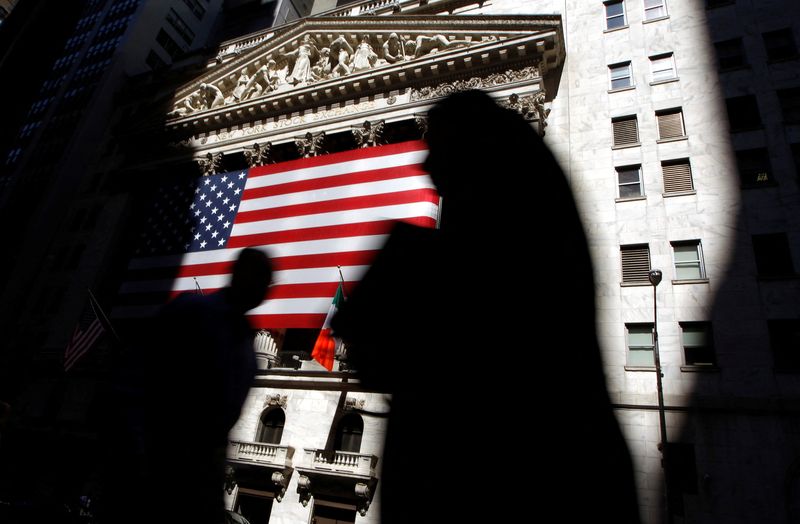Investing.com — JPMorgan and Bank of America are among a slew of major U.S. banks set to report their quarterly earnings on Friday. Markets will likely be keeping tabs on how the companies are bearing the weight of higher interest rates and expenses related to the collapse of regional banks last year. Elsewhere, demand for spot exchange-traded funds soars in the first trading day after the U.S. Securities and Exchange Commission approved them in a landmark decision.
1. Futures mixed
U.S. stock futures hovered around both sides of the flatline on Friday, with investors looking ahead to a crush of results from major Wall Street banks that typically signal the start of the quarterly earnings season.
By 05:19 ET (10:19 GMT), the contract had gained 51 points or 0.1%, were mostly unchanged, and had slipped by 35 points or 0.2%.
The main averages ended in a mixed fashion in the prior session, as traders reacted to official data showing that headline U.S. inflation accelerated in December. Meanwhile, the so-called “core” reading, which strips out volatile items like food and energy, slowed marginally.
Following the release of the numbers, Cleveland Fed President Loretta Mester told Bloomberg Television that there was “more work” needed to cool price pressures before the central bank can begin to contemplate lowering interest rates from more than two-decade highs. However, she added that the figures do not indicate that an easing in inflation is stalling.
Policymakers recently unveiled a dovish outlook for 2024, fueling a rally in stock and bonds late last year, although this momentum has waned after comments from several Fed members poured cold water on hopes for an imminent rate reduction. Markets are still factoring in a roughly two-in-three chance that the Fed will roll out a 25 basis-point cut as soon as March, according to the closely-monitored CME FedWatch Tool.
2. Bank profits seen slipping
The largest banks on Wall Street are widely tipped to report a combined decline in profit in the fourth quarter, due in part to an uptick in provisions for bad loans and higher deposit costs.
On Friday, JPMorgan Chase (NYSE:), Bank of America (NYSE:), Wells Fargo (NYSE:) and Citigroup (NYSE:) are set to kick off a spate of earnings from big financial institutions in the coming days. Goldman Sachs (NYSE:) and Morgan Stanley (NYSE:) will post their latest results on Tuesday.
Net interest income — the difference between what a lender pays for deposits and earns from loans — at these banking giants is estimated to have slipped by an average of 10% in the fourth quarter, Reuters reported, citing Goldman Sachs analysts.
The elevated interest rate environment is anticipated to have forced these companies to set aside more reserves to cover potential customer defaults and pay more to persuade depositors not to transfer their money to higher-yielding instruments. Indeed, Citigroup has already warned that it will book around $3.8 billion in charges and reserves, though much of these costs will stem from outside the U.S. in the form of currency exposure in Argentina and Russia.
Further expenses may have also arisen from a Federal Deposit Insurance Corp fund used to cover uninsured depositors, which major banks vowed to continuously replenish in the wake of a crisis in regional lenders last year.
Analysts will also likely be keeping a close eye out for signs of recovery in investment banking activity. Harsher rates have crimped corporate mergers and acquisitions recently, weighing on key advisory fees.
3. Spot Bitcoin ETFs volume exceeds $4 billion in first trading day
Trading volumes in exchange-traded funds (ETFs) tracking the price of Bitcoin surged on Thursday, signaling strong demand for the products after they were approved by the top U.S. securities regulator in a key ruling earlier this week.
Ten of these U.S. ETFs, which offer traders exposure to the world’s most popular cryptocurrency without directly owning it, saw trading of around $4.6 billion across the New York Stock Exchange, Nasdaq, and CBOE exchanges, according to LSEG data quoted by Reuters.
Spot Bitcoin ETFs sponsored by digital currency asset manager Grayscale and well-known players BlackRock (NYSE:) and Fidelity dominated the trading activity, Reuters added. Brazilian fund manager Hashdex was unable to covert an existing futures contract into a spot Bitcoin ETF because its paperwork remained under review by the U.S. Securities and Exchange Commission, the Financial Times reported.
On Wednesday, the SEC gave the green light on Wednesday to the spot Bitcoin ETF applications, in a decision that was projected to spark a rush of demand for the digital token. But detractors have flagged that the ETFs could persuade retail traders to pour money into a sector that has been beset with several fraud-related scandals and massive volatility.
4. Burberry slashes annual profit outlook
Burberry (LON:) stock slumped over 8% after the British luxury fashion brand warned on its full-year profit outlook for the second time in three months, blaming a slowing in global demand.
In a statement on Friday, the company flagged that it was hit by “further deceleration” in its December trading period, adding that a “challenging” market backdrop has hampered a planned overhaul of its items under former Versace boss Jonathan Akeroyd.
Adjusted operating profit for the financial year ended on Mar. 30 is now expected to be in the range of £410 million-£460 million, down from its prior guidance of £552M-£668M.
Rivals, such as LVMH (EPA:) and Kering (EPA:), have also reported weaker demand for high-end goods in crucial markets including the United States, Europe and China.
5. Oil jumps after strikes on Yemen
Oil prices soared Friday after U.S.-led forces launched airstrikes against the Iran-backed Houthi group in Yemen, increasing concerns over disruptions to Middle East supplies.
By 05:21 ET, the futures traded 3.2% higher at $74.35 a barrel, while the contract climbed 3.1% to $79.77 per barrel.
The United States and Britain carried out the strikes in retaliation for attacks by the Iran-backed group on shipping in the Red Sea starting from late last year, and came shortly after Iran seized an oil tanker with Iraqi oil in the Gulf of Oman.
Several major shipping operators have decided to steer clear of the region, disrupting supplies on the key route between Europe and Asia, which accounts for about 15% of the world’s shipping traffic.
Read the full article here











